Edward Feser's Blog, page 10
June 29, 2024
Hobbes and Kant on capital punishment
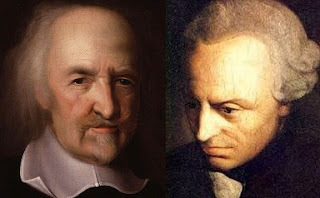 ThomasHobbes and Immanuel Kant both had an enormous formative influence on modernmoral and political philosophy, and on liberalism in particular. But their approaches are very different. Hobbes begins with what strikes the averagereader as a base and depressing conception of what individual human beings arelike in their natural state, and sees society arising out of an act of cold,calculating self-interest. Kant, bycontrast, seems committed to a lofty and inspiring conception of human beings,and regards society as grounded in a respect for the dignity of persons.
ThomasHobbes and Immanuel Kant both had an enormous formative influence on modernmoral and political philosophy, and on liberalism in particular. But their approaches are very different. Hobbes begins with what strikes the averagereader as a base and depressing conception of what individual human beings arelike in their natural state, and sees society arising out of an act of cold,calculating self-interest. Kant, bycontrast, seems committed to a lofty and inspiring conception of human beings,and regards society as grounded in a respect for the dignity of persons.Contemporaryopponents of capital punishment often appeal to a Kantian conception of humandignity, which they suppose naturally entails such opposition. And it might seem like advocacy of the deathpenalty would have to reflect something closer to Hobbes’s grim realpolitik. Yet when we consider the actual views ofHobbes and Kant themselves on thematter of capital punishment, we find that something closer to the opposite isthe case – Kant being enthusiastically (indeed excessively) favorable tocapital punishment, and Hobbes, if not utterly opposed to it, at leastsignificantly more negative about it.
This is noaccident, for each of these positions on the death penalty in fact fits quitenaturally with the premises from which Kant and Hobbes respectively derive them. And this, I submit, teaches us somethingabout the conception of human beings that modern opponents of capitalpunishment – and indeed many citizens of modern Western liberal democraticsocieties in general – are really operating with, at least implicitly. Modern people like to think of themselves ascuddly Kantians, when they are in fact closer to coldhearted Hobbesians. And their hostility to capital punishmentreflects, not a robust conception of justice but, on the contrary, an aversionto such a conception.
Hobbes on the death penalty
For Hobbes,the state of nature is essentially a state of amorality. Everyone has a perfect liberty to do what helikes, not because there is some moral imperative on everyone to allow othersto do so, but on the contrary because there are no moral imperatives atall. If you find your bliss in writingpoetry by moonlight, you are perfectly free to do that. And if some other person finds his bliss inbeating up people who write poetry by moonlight, he is perfectly free to do that. There is no objective fact of the matter aboutwhat either you or he ought toprefer, but merely facts about what you and he do in fact prefer, and such individual preferences are bound oftento be at cross purposes.
This, ofcourse, is why for Hobbes the state of nature is “a war of all against all,”with life inevitably “solitary, poor, nasty, brutish, and short.” It is to avoid this frightful situation thatrational individuals will, in Hobbes’s view, agree to leave the state of natureby giving up their liberty to do whatever they wish and consenting to beingruled by a sovereign. It is only at thispoint that rules of morality come into being, and they are essentially justwhatever laws the sovereign decrees. Butthey are binding on individuals only because they have consented to beinggoverned by them.
Now, Hobbesfamously draws an absolutist political conclusion from this, but what isrelevant for present purposes is this. For Hobbes, the default position is liberty to do whatever one likes;what makes it rational to give up some of that liberty is that, otherwise, onewould lose all of one’s liberty inslavery or death; and we are obligated to follow rules that limit liberty onlyinsofar as we consent to them.
That bringsus to what Hobbes says about capital punishment. Unsurprisingly, given his absolutism, Hobbesdoes not deny that the sovereign may resort to capital punishment in order touphold the law. Interestingly, however,this does not for Hobbes entail any obligation on the part of the condemnedcriminal to go along with such a punishment. In chapter 21 of Leviathan,Hobbes writes:
Covenants, not to defend a man’s ownbody, are void. Therefore, if the sovereigncommand a man (though justly condemned) to kill, wound, or maim himself; or notto resist those that assault him; or to abstain from the use of food, air,medicine, or any other thing, without which he cannot live; yet hath that manthe liberty to disobey…
In case a great many men togetherhave already resisted the sovereign power unjustly, or committed some capitalcrime, for which every one of them expecteth death, whether have they not theliberty then to join together, and assist, and defend one another? Certainly they have: for they but defendtheir lives, which the guilty man may as well do, as the innocent. There was indeed injustice in the firstbreach of their duty; their bearing of arms subsequent to it, though it be tomaintain what they have done, is no new unjust act. And if it be only to defend their persons, itis not unjust at all.
This makes sensegiven Hobbes’s account of the basis of morality. If the default position is liberty to dowhatever I want to do, and I can lose this liberty only insofar as I consent to losing it – and if I can rationally consent to losing it onlybecause I would face death otherwise – then it is clear why Hobbes wouldconclude that I cannot lose my liberty to preserve my own life, not even if Iconsent to doing so. For, again, it isprecisely the desire to preserve mylife that is the only reason I could rationally consent to give up any libertyat all.
As LeoStrauss remarks in Natural Right andHistory, this introduces a tension into Hobbes’s system. If it would in some cases be just for thesovereign to punish me with death, how could I justly resist? Or if I can always justly resist, how can itbe just for the sovereign ever to inflict such a punishment? As Strauss writes, “this conflict was solvedin the spirit, ifagainst the letter, of Hobbes by Beccaria, who inferred from the absoluteprimacy of the right of self-preservation the necessity of abolishing capitalpunishment” (p. 197). Hobbes’s accountof morality in fact entails this abolitionist position even if he only gothalfway to it himself.
Straussmakes another crucial observation. Hobbes’s account only works if death is indeed the worst fatepossible. But “in many cases the fear ofviolent death prove[s] to be a weaker force than the fear of hell fire or thefear of God” (p. 198). Naturally, suchfear could change the whole calculation even for those in Hobbes’s state ofnature. Perhaps, if people feared Godand damnation most of all, they would resist the sovereign far beyond whatHobbes would allow, choosing to risk offending the state rather than to riskoffending God. Or perhaps, in apenitential spirit, they would submit even to punishments like enslavement andexecution, looking forward to a reward in the hereafter.
To make hisaccount of morality and politics work, then, Hobbes requires a social contextthat is secularist rather than otherworldly in its basic orientation. For only in such a context can the fear ofdeath be more vivid than the fear of eternal damnation, and thus do the workHobbes needs for it to do. As Strausswrites:
The whole scheme suggested by Hobbesrequires for its operation the weakening or, rather, the elimination of thefear of invisible powers. It requiressuch a radical change of orientation as can be brought about only by thedisenchantment of the world… Hobbes’s is the first doctrine that necessarilyand unmistakably points to a thoroughly ‘enlightened’, i.e., a-religious oratheistic society as the solution of the social or political problem. (p. 198)
In short, Hobbes’ssystem of ethics and political philosophy entails an abolitionist position oncapital punishment because of its radical individualism and secularism. In particular, it holds that limitations onthe individual’s freedom to do whatever he wants are justifiable only if heconsents to them, and that no individual could consent to being executedbecause death is worst of all fates.
Kant on capital punishment
Kant takesthe fundamental principle of morality to lie in what he calls the categorical imperative, the secondformulation of which is: “Act in such a way that you always treat humanity,whether in your own person or in that of any other, never simply as a means,but always at the same time as an end.” Theidea here is that human beings, as rational beings possessing intellects andfree will, have by nature a kind of autonomy or self-determination thatnon-human animals, plants, and inorganic things do not. When we treat human beings as nothing morethan resources for the realization of our own ends (the way we might treat asub-rational being of one of the kinds mentioned) we thereby fail to deal withthem in a way that is appropriate given their nature. This formulation of the categoricalimperative is thus taken to give expression to the idea of the special dignity of the human person, and of thespecial respect we owe such personsgiven their dignity.
Now, inrecent decades this notion of “the dignity of the human person” has beendeployed, especially in certain Catholic contexts, to criticize capitalpunishment, harsh and humiliating punishments more generally, and the idea thatretribution is the central function of punishment. Interestingly, though, Kant himself drewexactly the opposite of these conclusions, at every point.
Hence,consider his treatment of the topic of punishment in The Metaphysical Elements of Justice. In the name of respect for persons, manytoday suggest that retribution is not an appropriate motivation for any punishment,and that instead it can only be inflicted if it is needed to protect society orto promote the rehabilitation of the offender. But here is what Kant says:
Judicial punishment can never be usedmerely as a means to promote some other good for the criminal himself or forcivil society, but instead it must in all cases be imposed on him only on theground that he has committed a crime; for a human being can never bemanipulated merely as a means to the purposes of someone else and can never beconfused with the objects of the Law of things. His innate personality [that is, his right as a person] protects himagainst such treatment, even though he may indeed be condemned to lose hiscivil personality. He must first befound to be deserving of punishment before any consideration is given to theutility of this punishment for himself or for his fellow citizens. The law concerning punishment is acategorical imperative, and woe to him who rummages around in the winding pathsof a theory of happiness looking for some advantage to be gained by releasingthe criminal from punishment or by reducing the amount of it. (p. 100, Laddtranslation)
Note firstof all that Kant argues here that to punish someone merely for the good ofsociety (which would include protecting it from him) or even for the sake ofsome utility it may afford him (which would include rehabilitation) violatesthe categorical imperative, because it treats him merely as a means rather thanas an end in himself. The only motivefor punishment that respects his nature as a person is the motive of simplygiving him what he deserves – in other words, retribution – and only with thatmotivation first in place can any thought be given to what might promote thegood of society or of the offender.
So far, thisis just the traditional understanding of the purposes of punishment, andcorresponds to traditional Catholic teaching from Genesis to Thomas Aquinas tothe Catechism, at least as Pope St. John Paul II left it. (See ByMan Shall His Blood Be Shed, my book co-written with JosephBessette, for a refutation of the claim that John Paul II changed Catholicteaching in this respect.) But Kant’sposition is even more austere than that, ruling out considerations of mercythat in Catholic teaching balance out considerations of justice. For Kant’s view is not merely that, when we punish, we must have retributionin mind first and foremost. He holdsthat we must punish an offender. In his view, respect for human dignity notonly allows the state to inflict on acriminal his just deserts but requires thestate to do so. And he takes this tofollow precisely from the fact that respect for persons – which includesholding them responsible, and thus worthy of punishment, for the bad thingsthey do – is a categoricalimperative, commanding unconditionally.
Exactly whatkinds of punishments must be inflicted? Kant answers as follows:
Any undeserved evil that you inflicton someone else among the people is one that you do to yourself. If you vilify him, you vilify yourself; if yousteal from him, you steal from yourself; if you kill him, you killyourself. Only the Law of retribution(jus talionis) can determine exactly the kind and degree of punishment... [Thisis] the retributive principle of returning like for like. (p. 101)
This issometimes referred to as the principle ofproportionality, and here too Kant’s position corresponds to traditionalCatholic teaching from the Old Testament to the Catechism of John Paul II. For example, echoing Kant’s point that it isultimately the offender who inflicts on himself whatever he does to others,Pope Pius XII taught:
Even when it is a question of theexecution of a condemned man, the State does not dispose of the individual’sright to life. In this case it isreserved to the public power to deprive the condemned person of the enjoymentof life in expiation of his crime when, by his crime, he has already disposedhimself of his right to live.
Here too,though, Kant goes further than the traditional view. It is not merely that proportionality givesus a criterion for determining what punishment to inflict whenever we dopunish. It is that we must, as far as we are able, return likefor like. He notes, for example, that“the imposition of a fine for a verbal injury has no proportionality to theoriginal injury” (p. 101). Instead, hesays:
The humiliation of the pride of suchan offender comes much closer to equaling aninjury done to the honor of the person offended; thus the judgment and Lawmight require the offender, not only to make apublic apology to the offended person, but also at the same time to kiss hishand, even though he be socially inferior. Similarly, if a man of a higher class has violently attackedan innocent citizen who is socially inferior to him, he may be condemned, notonly to apologize, but to undergo solitary and painful confinement, because bythis means, in addition to the discomfort suffered, the pride of the offenderwill be painfully affected, and thus his humiliation will compensate for theoffense as like for like. (pp. 101-2)
Notice thathere too, Kant draws precisely the opposite lesson from human dignity that manytoday who appeal to it do. It is oftenclaimed today that it is contrary to human dignity to inflict harsh orhumiliating punishments. But as Kantargues, in reality, if the offender has himself treated others in a harsh orhumiliating manner, then he deserves such treatment in return, and inflictingit on him thus respects his dignityas a person precisely by holding him responsible as a free and rational agent.
For thisreason, Kant even argues that justice requires that, as part of theirpunishment, thieves must be forced to labor (p. 102). For they have stolen from others, and if,while in prison, they are fed and sheltered at state expense, this only compoundstheir unjust taking of resources that rightfully belong to others. Hence, while it is widely taken for grantedtoday that penal servitude is contrary to a Kantian respect for persons, Kanthimself argued that respect for the dignity of persons requires penal servitude ifthe offender has done something to merit it. (Here again, Kant goes beyond what became standard Catholic teaching,which holds that while penal servitude can for the reasons Kant gives bejustifiable in theory, in practice it should not be used, becauseit has a tendency to degenerate into chattel slavery, which is intrinsicallyimmoral.)
This bringsus at last to Kant’s position on capital punishment. He writes:
If, however, he has committed amurder, he must die. In this case, thereis no substitute that will satisfy the requirements of legal justice. There is no sameness of kind between deathand remaining alive even under the most miserable conditions, and consequentlythere is also no equality between the crime and the retribution unless thecriminal is judicially condemned and put to death. But the death of the criminal must be keptentirely free of any maltreatment that would make an abomination of thehumanity residing in the person suffering it. Even if a civil society were to dissolve itself by common agreement ofall its members (for example, if the people inhabiting an island decided toseparate and disperse themselves around the world), the last murderer remainingin prison must first be executed, so that everyone will duly receive what hisactions are worth and so that the bloodguilt thereof will not be fixed on thepeople because they failed to insist on carrying out the punishment; for ifthey fail to do so, they may be regarded as accomplices in this publicviolation of legal justice. (p. 102)
In endorsingthe idea that the principle of proportionality justifies executing those whoare guilty of murder, Kant is, once again, echoing traditional Catholic teaching. But here too he goes well beyond it byinsisting that the moral law not only allows,but requires, the execution ofmurderers.
Kant addssome further remarks that reinforce how radically different his position isfrom that of Hobbes. Suppose for thesake of argument that the law were to allow a murderer to opt, instead of thedeath penalty, for the lesser punishment of penal servitude. Kant comments:
I say that a man of honor wouldchoose death and that the knave would choose servitude. This is implied by the nature of humancharacter, because the first recognizes something that he prizes more highlythan life itself, namely, honor, whereas the second thinks that a life covered with disgrace is still better than not beingalive at all (animampraeferre pudori). The first is without doubt less deserving ofpunishment than the other. (p. 103)
For Hobbes,death is the worst thing that can happen to us; for Kant, dishonor is worsestill. For Hobbes, reason tells theoffender facing execution to do what he can to avoid it; for Kant, reason tellsthe offender to accept execution, precisely because, as a free and rationalagent, he has done something to deserve it. For Hobbes, there is no injustice in resisting execution, even though theoffender has done something to deserve it; for Kant, for a murderer to resistexecution only makes him even more deservingof it.
Unquestionably,here too Kant, though going beyond what traditional Catholic teaching strictlyrequires, is much closer to it than Hobbes is. Consider, for example, the Good Thief, who while dying on his cross saidto his fellow criminal that “we are punished justly, for we are getting whatour deeds deserve” (Luke 23:41) – and to whom Christ went on to promise paradise. Or consider the original 1992 version of the Catechism of the Catholic Churchpromulgated by Pope St. John Paul II, which, after reaffirming the legitimacyin principle of the death penalty for sufficiently grave crimes, goes on to saythat “when his punishment is voluntarily accepted by the offender, it takes onthe value of expiation” (2266).
Hobbesians in Kantian drag
As I’vesaid, many today, especially in Catholic circles, claim that the notion ofhuman dignity put at the center of modern moral philosophy by Kant requiressoftening the traditional approach to punishment, and capital punishment inparticular. Yet, ironically, Kanthimself essentially argued that respect for human dignity requires taking a harsher approach than the traditionalone. Of course, one could try to arguethat Kant was wrong, and that respect for human dignity does in fact requiremoving away from the traditional view. Butas Bessette and I show in our book, none of the arguments to this effect thathave been offered succeeds.
Moreover, tothe extent that they emphasize the unique awfulness of death and the waypunishment affronts the freedom of the offender, contemporary abolitionistarguments are much closer in spirit to Hobbes than to Kant. The rhetoricmay often be Kantian, but the substanceis Hobbesian.
And that isa second irony, when the abolitionists in question are Catholic. For Hobbes was, of course, a great enemy ofthe Catholic Church, which, in Leviathan,he portrayed as the chief agent in what he called the “kingdom of darkness.” The moderns simply cannot give Catholicmodernizers what they want. Kant cannotdo so, because his view on matters of punishment is more traditional thanmodern. And Hobbes cannot do so, becausewhile his position is modern, it is the opposite of Catholic.
June 21, 2024
Immortal Souls in eBook format
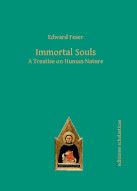 The paperbackversion of my new book Immortal Souls: ATreatise on Human Nature soldout on Amazon within a day of being listed there. No word on when it will be back in stock, butI imagine it will be soon. Meanwhile,the eBook version is availablethrough Barnes and Noble. You canalso order either version through thepublisher’s website or through Amazon’s websites in theU.K. and Germany.
The paperbackversion of my new book Immortal Souls: ATreatise on Human Nature soldout on Amazon within a day of being listed there. No word on when it will be back in stock, butI imagine it will be soon. Meanwhile,the eBook version is availablethrough Barnes and Noble. You canalso order either version through thepublisher’s website or through Amazon’s websites in theU.K. and Germany.
June 18, 2024
Scruton on tradition
 RogerScruton’s essay “Rousseauand the Origins of Liberalism” first appeared in The New Criterion in 1998, and wasreprinted in The Betrayal of Liberalism,edited by Hilton Kramer and Roger Kimball. Among the many good things in it, there is an important expression anddefense of the conservative understanding of tradition. Scruton writes:
RogerScruton’s essay “Rousseauand the Origins of Liberalism” first appeared in The New Criterion in 1998, and wasreprinted in The Betrayal of Liberalism,edited by Hilton Kramer and Roger Kimball. Among the many good things in it, there is an important expression anddefense of the conservative understanding of tradition. Scruton writes:Modern liberals tend to scoff at theidea of tradition. All traditions, theytell us, are “invented,” implying that they can therefore be replaced withimpunity. This idea is plausible only ifyou take the trivial examples – Scottish country dancing, Highland dress, theCoronation ceremony, Christmas cards, and whatever else comes with a “heritage”label. A real tradition is not aninvention; it is the unintended byproduct of invention, which also makesinvention possible… [A] tradition, precisely because it is not invented, hasauthority. “Unintended byproducts” ofinvention contain more knowledge than any person can discover unaided.
The specificexample Scruton focuses on in the essay is the Western system of musicalnotation (which was criticized by Rousseau). He also mentions common law, parliamentary procedures, manners andsocial conventions, dress, and morality. (In order to see his point vis-à-vis this last example, one need notregard all moral principles to be theproducts of tradition in the relevant sense. One can recognize a natural law that is deeper than tradition andunalterable, while allowing that there is also a layer of moral principles thatare of greater binding force than mere etiquette, even if not having theabsolute or unalterable status of natural law – a layer sometimes called the ius gentium or law of peoples.)
Part of whatScruton is saying here is that traditional practices and principles of thesekinds, though not infallible or absolutely unalterable, nevertheless have apresumption in their favor, precisely because they have so far stood the testof time. That is, of course, a familiarenough conservative theme.
But there ismore to it than that. The most importantkinds of tradition, Scruton notes, are not practices or principles that weredeliberately invented by some particular individual and then went on tolast. Rather, they are practices orprinciples that were not the productof any one person’s ingenuity, but rather evolved gradually as a byproduct ofthe actions of multiple individuals operating over a span of time, none of whomwas deliberately trying to produce them. No one person invented the system of musical notation, for example, orcame up with the principles implicit in common law, or decided what theprevailing rules of etiquette would be. These are rather what the Scottish Enlightenment thinker Adam Fergusonfamously characterized as “the products of human action but not human design.”
A furtherpoint is that, precisely because such practices and principles evolve in thisway, they often reflect more information about the world than any oneindividual is likely to have available to him. Consider, for example, a system of rules of etiquette that includesprinciples like the following: When you first meet someone, offer your name andacknowledge him with a handshake or nod; do not bring up controversial mattersof religion or politics in conversation with people you do not know well; whendining with others, wait until they have been served their meal beforebeginning to eat your own; when dining with others, do not smack your lips,slurp your beverage, lick your fingers, belch, or otherwise behave in a mannerlikely to be off-putting to those around you; when in an elevator, on a bus,using a public walkway, or the like, allow a few feet of space if possiblebetween you and those around you; do not speak loudly or in any manner thatmight disturb others when in a library, movie theater, or the like; etc.
Any systemof etiquette is going to include innumerably many such rules. It will also typically acknowledgequalifications or exceptions to the rules. And it will reflect broader cultural circumstances (which may notprevail in other societies, which is one reason not all cultures have the samerules of etiquette). No one person couldcome up with such a system, because no one person could foresee all thecontexts in which such rules might be needed, all the cultural circumstancesrelevant to determining exactly what the rules should be, all theconsiderations that might justify exceptions to the rules or call forqualifications, and so on. Such rulesinstead develop over generations by trial and error, and gradually harden intoa set of customs that people simply take for granted.
In no waydoes this make them arbitrary, though. On the contrary, they serve a crucial function of letting people knowhow to act in a manner conducive to amiable and efficient social interaction,and they are able to do so because they answer real human needs that followupon both human nature and concrete cultural circumstances. The impersonal process by which suchtraditional practices form reflects all the relevant considerations, which nosingle human mind could have information about in advance.
There is inthis sense a kind of wisdom embodied in tradition that gives it an authority noindividual could have, because no individual could have the wisdom inquestion. This is what Scruton meanswhen he says that “a tradition, precisely because it is not invented, hasauthority.”
Scrutonobserves that tradition, which is an “unintended byproduct of invention,” also “makesinvention possible.” Naturally, he doesn’tmean that it makes all inventionpossible, which would entail a paradox (insofar as invention would presupposetradition but tradition also presuppose invention). What he means is that it makes certain further kinds of inventionpossible. Individuals can, of course,deliberately bring about novelties in common law, parliamentary procedure,etiquette and other social conventions, and for that matter morality. No one denies that. Scruton’s point, and that of other conservativethinkers, is that individuals can do this, and do it with beneficial results,only insofar as the novelties are piecemeal additions to or alterations of alarger preexisting body of practices and principles that they did not invent, and could not themselves haveinvented wholesale.
As Scrutonnotes, this conception of tradition, or ideas in the general ballpark, havebeen put forward by thinkers like Burke, Mises, Oakeshott, and Hayek. While there is a broad sense in which thesethinkers can be called “conservative,” they are also all in the broad “classicalliberal” tradition associated with the likes of John Locke and Adam Smith. Should that in some way cast doubt on theconservative credentials of what they have to say about tradition, at leastfrom the point of view a postliberal conservative?
No. For one thing, it would be foolish and indeedfallacious (specifically, an instance of the genetic fallacy) to assume that anidea must be suspect merely becauseit is associated with thinkers with whom one otherwise disagrees. Moreover, there is an obvious respect inwhich the conception of tradition described by Scruton echoes themes to befound in the more traditional sort of conservatism that looks to Aristotle andAquinas for its primary inspiration. AsAristotle emphasizes, moral virtue is acquired first and foremost byhabituation, and theoretical understanding comes only later if at all. He was talking about the individual humanbeing, but something analogous can be said of the social organism. The habits embodied in its morals,conventions, and culture more generally can exhibit a kind of virtue even ifthose who make up society do not have a theoretical understanding of the valueof the practices and principles they are following. Just as Aristotle would say that it is anerror to suppose that theoretical understanding of morality should or couldprecede the practice of morality, so too do thinkers like Burke, Oakeshott,Hayek and Scruton argue that it is a mistake to suppose that theoreticalunderstanding of the value of various specific traditional principles and practicescan or should precede our adherence to those principles and practices. The point is decidedly Aristotelian, even ifthe thinkers in question have other commitments with which an Aristotelianwould not agree.
There isalso, I would suggest, at least a very general parallel between the conceptionof tradition described by Scruton and the conception of tradition operative inCatholic theology (albeit I am by no means claiming they are exactly thesame). Newman famously theorized aboutthe development of dogma, and part of his point is that the system of Christiandoctrine is not and could not have been explicitly and entirely formulated allat once. Rather, precise and explicitformulations came about gradually in response to specific historical circumstances,such as the rise of certain heresies that needed to be rebutted, applicationsto concrete cases that hadn’t previously been foreseen or addressed, and soon. For example, no one person hammeredout the entirety of what become the Church’s settled doctrine on the mainpoints of Christology. Rather, it was theresult of centuries of reflection by Fathers of the Church, the teaching ofvarious councils, and so on, each stage being a response to specific aspects ofthe issue that arose under specific circumstances.
Asunderstood by Newman, “development” is something that happens with doctrine as a consequence of the contribution of manyindividuals. It is not some action that a particular individualperforms (even if the actions of particular individuals, such as popes, andbishops gathered in councils, contribute to the overall development). In recent years, however, churchmen andtheologians often do speak of “development” as something active, something thata pope, for example, might decide to do.
The resultsare not always salutary. An examplewould be the statements many contemporary churchmen have made on the topic ofcapital punishment. There have inCatholic tradition always been theologians and churchmen who tended to opposethe death penalty, just as there have been those who tended to support it. But in recent decades, the rhetoric against ithas often been far more extreme than what can be found in the earlier Catholictradition, and indeed sometimes directly contradicts that tradition. This rhetoric is grounded less in considerationsabout mercy or the facilitation of repentance (as earlier Catholic reservationsabout capital punishment were) than in an exaggerated conception of humandignity that owes more to Kant and modern philosophical liberalism than it doesto scripture, the Fathers and Doctors of the Church, or the consistent papalteaching of two millennia. While scripturaltexts and earlier magisterial statements are sometimes appealed to in itsdefense, they are given novel interpretations, and scriptural and magisterialtexts that point the other way are ignored.
Scruton pointsout that the liberal in politics who tosses aside traditional practices andprinciples naively and arrogantly supposes that he can do better, when in facthis novelties are grounded in a far more short-sighted view of things than isembodied in tradition. He often ends upgenerating chaos, and the tradition he has undermined cannot easily be revived. (To borrow a famous analogy of Wittgenstein’s,restoring the common sense embodied in tradition after it has been lost is liketrying to repair a torn spider’s web with one’s fingers.)
Somethingsimilar is true in theology – indeed, it is moretrue in theology, since the credibility of any claim to represent thedeliverances of divine revelation crucially depends on consistency with whatthat revelation has always been understood to say. For modern churchmen to imply by their wordsand actions that even two millennia of consistent traditional teaching cannotbe trusted can only generate skepticism about the trustworthiness of thesechurchmen themselves. In theology as inpolitics, those who undermine tradition saw off the branch on which they arethemselves sitting.
June 7, 2024
Immortal Souls now available for pre-order
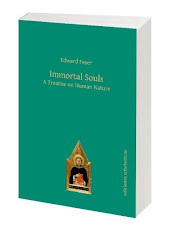 My new book Immortal Souls: A Treatise on Human Natureis nowavailable for pre-order in the U.S. at Amazon.com. Here again are the back cover copy,endorsements, and table of contents:
My new book Immortal Souls: A Treatise on Human Natureis nowavailable for pre-order in the U.S. at Amazon.com. Here again are the back cover copy,endorsements, and table of contents:Immortal Souls provides as ambitious and complete adefense of Aristotelian-Thomistic philosophical anthropology as is currently inprint. Among the many topics covered arethe reality and unity of the self, the immateriality of the intellect, thefreedom of the will, the immortality of the soul, the critique of artificialintelligence, and the refutation of both Cartesian and materialist conceptionsof human nature. Along the way, the mainrival positions in contemporary philosophy and science are thoroughly engagedwith and rebutted.
“EdwardFeser's book is a Summa of the nature of the human person: it is, therefore,both a rather long – but brilliant – monograph, and a valuable work forconsultation. Each of the human faculties discussed is treated comprehensively,with a broad range of theories considered for and against, and, althoughFeser's conclusions are firmly Thomistic, one can derive great benefit from hisdiscussions even if one is not a convinced hylomorphist. Every philosopher ofmind would benefit from having this book within easy reach.”
HowardRobinson, Professor Emeritus of Philosophy, Central European University
“Feserdefends the Aristotelian and Thomistic system, effectively bringing it intodialogue with recent debates and drawing on some of the best of both analytic(Kripke, Searle, BonJour, Fodor) and phenomenological (Heidegger,Merleau-Ponty, Dreyfus) philosophy. He deftly rebuts objections to Thomism,both ancient and modern. Anyone working today on personal identity, the unity ofthe self, the semantics of cognition, free will, or qualia will need to engagewith the analysis and arguments presented here.”
Robert C.Koons, Professor of Philosophy, University of Texas at Austin
CONTENTS
Preface
Part I: Whatis Mind?
1. The ShortAnswer
2. TheSelf
3. TheIntellect
4. TheWill
Part II:What is Body?
5. Matter
6. Animality
Part III:What is a Human Being?
7. AgainstCartesianism
8. AgainstMaterialism
9. NeitherComputers nor Brains
Part IV:What is the Soul?
10.Immortality
11. The Formof the Body
Index
Moreinformation about the book is available at thepublisher’s website.
June 5, 2024
Postliberalism is not despotism
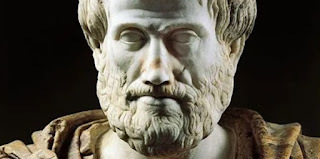 In anew article at Postliberal Order,I explain why, contrary to a common straw man, postliberalism does not entaildespotism.
In anew article at Postliberal Order,I explain why, contrary to a common straw man, postliberalism does not entaildespotism.
June 1, 2024
Multiverses and falsifiability
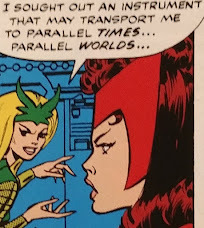 AdamBecker’s 2018 book
Whatis Real? The Unfinished Quest for the Meaning of Quantum Physics
is an excellent account of the longstanding and intractable controversy overhow to interpret quantum mechanics. Oneof the main themes of the book is how much the direction of twentieth-centuryphysics was driven by personalities, political factors, career interests, and,not least, unexamined and woolly philosophical assumptions – something philosophersof science like Thomas Kuhn and Paul Feyerabend have shown has always been true of science historically. The tendency of contemporary physicists,especially, to be both ignorant of and condescending toward philosophy comes infor special criticism.
AdamBecker’s 2018 book
Whatis Real? The Unfinished Quest for the Meaning of Quantum Physics
is an excellent account of the longstanding and intractable controversy overhow to interpret quantum mechanics. Oneof the main themes of the book is how much the direction of twentieth-centuryphysics was driven by personalities, political factors, career interests, and,not least, unexamined and woolly philosophical assumptions – something philosophersof science like Thomas Kuhn and Paul Feyerabend have shown has always been true of science historically. The tendency of contemporary physicists,especially, to be both ignorant of and condescending toward philosophy comes infor special criticism.In at leastone case, though, Becker himself is a bit too dismissive of a philosophicalline of argument. Becker discusses howthe notion of a multiverse has beendefended by many physicists on the basis of several independent considerations,viz. Hugh Everett’s “many worlds” interpretation of quantum mechanics, inflationarycosmology, and string theory. Oneobjection raised against the notion in any of these versions is that it is unfalsifiable – that is to say, that itgenerates no predictions that could in principle be proven false by observationand experiment, in which case it is empirically untestable.
Beckerrightly notes that falsifiability, a theme made famous by Karl Popper, is notas straightforward a matter as popular presentations often suppose. For one thing, a scientific theory is nevertested in isolation, because it never generates predictions in isolation. Rather, its predictions follow from thetheory only together with variousfurther assumptions of a theoretical or empirical kind.
For example,suppose researchers working for a soap company want to determine whether thechemical ingredients in a new product they are developing really will, as theysuppose, kill certain kinds of bacteria. They put samples of the bacteria on a slide, apply the soap, and seewhat happens. If the bacteria are notdestroyed, has the theory been falsified? Not necessarily. For in making andtesting the prediction that the soap will kill the bacteria, they are assumingthat dead bacteria will have such-and-such an appearance under a microscope, thatthe slide on which they are put has been cleaned properly (and thus doesn’t havesome residue of chemicals that might counteract the effect of the soap they aretesting), that the standard theory about how microscopes work is correct, thatthe particular microscope being used is not malfunctioning, and so on. And if the test does not come out aspredicted, it could be that one ofthese background assumptions is false, rather than that the soap does notreally kill such bacteria.
Of course,there may be very good reasons for judging that none of these assumptions isfalse, so that the reasonable conclusion to draw is that the soap is not infact effective against the bacteria. Thepoint, though (famously emphasized by Pierre Duhem and W. V. Quine), is that testinga scientific claim is not a matter of carrying out a “crucial experiment” thatmight all by itself either falsify or vindicate the claim. There is often a certain amount of wiggleroom by which a theory might inprinciple be upheld in the face of apparent counterevidence, even if actually continuingto uphold it is not necessarily reasonable all things considered.
Beckerdiscusses a famous pair of examples from the history of science that illustratehow complicated the matter of falsification actually is. Newtonian physics was in generalspectacularly successful in describing and predicting the observed motions ofbodies, but there were exceptions. Themotions of Uranus and Mercury did not conform to the predictions of Newton’slaws, but for a very long time, this did not lead scientists to judge that Newtonhad been refuted. After all, the theoryworked for most observations, and there was at first nothing better to put inits place. So, they looked foralternative explanations of the divergence between observation and theory. In the case of Uranus, it turned out that itsmotion was being affected by the gravitational pull of another, heretoforeunknown planet, Neptune. That particularproblem for Newton’s theory was thus solved. But the conflict with the observed motion of Mercury resisted anysimilar solution, and it wasn’t until Einstein’s general theory of relativityappeared – and explained the motion of Mercury along with all the observationalevidence that Newton could explain – that Newton’s theory was judged to havebeen falsified, and Einstein’s adopted in its place.
So far sogood. But Becker then fallaciously drawsfrom these considerations the conclusion that “scientific theories don’t needto be falsifiable” (p. 264) so that:
Claiming, then, that multiversetheories are unscientific because they are unfalsifiable is to reject them simplybecause they do not live up to an arbitrary standard that no scientific theoryof any kind has ever met. Claiming thatno data could ever force the rejection of a multiverse theory is merely statingthat a multiverse theory is just like any other theory. (p. 263)
This is nottrue, and it certainly doesn’t follow. To understand what is wrong with Becker’s position, we need to draw somedistinctions. First, Popper argued thatfalsifiability comes in degrees. Some statements might have empiricalconsequences independently of any others, other statements might have empiricalconsequences only in conjunction with further statements, and yet otherstatements might have no empirical consequences at all. The first sort of statement would be strongly falsifiable, the second weakly falsifiable, and the thirdutterly unfalsifiable.
Now, even ifthe considerations raised by Becker show that a scientific theory need not be strongly falsifiable, it doesn’t followthat it can be altogether unfalsifiable. It may, for all Becker has shown, still needto be at least weakly falsifiable. Now, the critic of multiverse theories mightargue that whereas Newton’s physics was weaklyfalsifiable, multiverse theories are altogether unfalsifiable, so that theparallel Becker wants to draw is bogus. And in that case, Becker’s response does not suffice to save multiversetheories from the objection in question. He would have to show, either that multiverse theories are at leastweakly falsifiable, or that a scientific theory need not be even weaklyfalsifiable. And he does not establisheither of these claims.
But even ifhe were to take the second route and argue that scientific theories needn’t beeven weakly falsifiable, there is a further problem, as can be seen by drawingsome further distinctions. For there aredifferent ways in which a statementmight be empirically unfalsifiable, some of them unproblematic but some of themproblematic.
First, thereare statements that are unfalsifiable inthe way that mathematical and metaphysical truths can be. For example, that 2 + 2 = 4 and that thefundamental constituents of reality are substances (as opposed to attributes, say,or events) are, I would argue, not empirically falsifiable. That is not because they are less certain than empirical claims, butbecause (as I would also argue) they are morecertain. They are bedrock truths thatpertain to any possible reality, to non-empiricalimmaterial reality no less than to the empirical, material world.
Second,there are statements that are unfalsifiable inthe way that truths of the philosophy of nature can be. These are claims that, unlike those of the firstcategory, do apply only to empirical reality yet are nevertheless certain. For example, take the claim that change occurs. We know this statement empirically, but it isnot empirically falsifiable for thesimple reason that to falsify something requires having a sequence ofexperiences (as happens when we set up an experiment, carry it out, and thenrecord the results). And having asequence of experiences itself involveschange. To try empirically to falsifythe claim that change occurs would thus be self-defeating. That does not entail that the reality ofchange is less certain than other empirical truths, but rather that it too ismore certain.
Third, thereare statements that are unfalsifiable inthe way that the most fundamental theses of modern empirical science arguablyare. For example, some have heldthat the principle of the conservation of energy and the second law ofthermodynamics are unfalsifiable. Thisis debatable, but it is certainly plausible to maintain that these ideas are socentral to modern science’s picture of the universe that they are treated in practice as unfalsifiable, even ifthey are falsifiable in principle. Theidea is that giving them up would so radically undermine the rest of the modernscientific edifice that, if there ever appeared to be evidence that conflictedwith them, scientists would judge that there must be something wrong with theevidence or with other parts of science, rather than that these fundamental principlesthemselves are false.
Fourth,there are statements that are unfalsifiable inthe way that Popper famously took astrology, Marxism, and Freudianism to be. These are statements that purport to beempirical rather than metaphysical, but are neither parts of the philosophy ofnature nor central to the modern scientific picture of the world. Because they do not fall into the first threecategories I’ve just described, the reason they are unfalsifiable is not thatthey are necessary truths (the way mathematical and metaphysical truths are),or because denying them would be self-defeating (the way denying my example ofa truth in the philosophy of nature would be), or because to deny them wouldtake down the whole edifice of science (as the examples in the third categorywould). So, they do not have the certainty that truths in these othercategories have. The reason they areunfalsifiable is instead that they make predictions that are too vague oropen-ended to be crisply testable.
Now, it is unfalsifiabilityof this fourth kind that is the mostproblematic, and that Popper took to be paradigmatic of pseudo-science. The first two kinds of unfalsifiablestatement are, I would argue, unproblematic, and the third kind is at leastarguably defensible. Suppose multiversetheories are indeed unfalsifiable. Whichof these four classes would they fall in?
They don’tfall into the first category, because their description of the world is not trueof metaphysical or arithmetical necessity. That is why even defenders of multiversetheories typically allow that they mightbe wrong, and at least try to come upwith ways of testing such theories empirically. This would make no sense if the theories had the bedrock status thattruths of mathematics and metaphysics are traditionally claimed to have.
They alsodon’t fall into the second category, because they aren’t fundamental truthsabout what any possible empirical world must be like, which it would beself-defeating to deny. Again, evendefenders of multiverse theories allow that they might be wrong, and certainly one can doubt such theories withoutbeing led into incoherence (by contrast with the attempt to deny the reality ofchange, which, I would argue, wouldbe incoherent).
Nor do multiversetheories fall into the third category, because they are hardly fundamental to the modern scientific pictureof the world in the way that the conservation of energy and the second law ofthermodynamics are. This is obvious justfrom the fact that they are highly controversial in a way that the fundamentalscientific principles mentioned are not.
So, ifmultiverse theories really are not even weakly falsifiable, but altogetherunfalsifiable, it looks like they will fall into the fourth and most problematicclass of unfalsifiable theories, alongside astrology, Marxism, andFreudianism. And in that case, Beckerwill not have succeeded in defending multiverse theories from the objection inquestion.
Successfullyto defend them against that objection would require either (a) showing thatunfalsifiable statements even of the fourth category are scientificallyrespectable, (b) showing that multiverse theories are, appearances notwithstanding,unfalsifiable in the way that statements in one of the other three categoriesare, or (c) showing that multiverse theories are in fact falsifiable and opento empirical testing. I don’t think thatany of these routes is promising, but route (c) would certainly be the way togo if the defender of a multiverse theory wants to convince anyone that suchtheories are “scientific” in just thesame sense that what Newton, Einstein, and the founders of quantummechanics were up to was scientific. Todo that, however, would not be to sidestepthe objection from falsifiability (as Becker wants to do), but precisely tomeet the objection head on.
May 30, 2024
Update on Immortal Souls
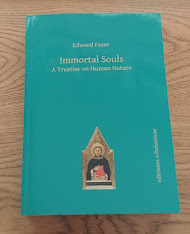 Immortal Souls has at last been reduced frompotency to act. The official publicationdates are in June for Europe and July in the United States. Pre-order is now possible at Amazon’s websitesinthe U.K. and inGermany. It should be available forpre-order soon at Amazon’s U.S. website, and I’ll let you know when it is. You can find the table of contents andendorsements here,and other details at the publisher’sweb page.
Immortal Souls has at last been reduced frompotency to act. The official publicationdates are in June for Europe and July in the United States. Pre-order is now possible at Amazon’s websitesinthe U.K. and inGermany. It should be available forpre-order soon at Amazon’s U.S. website, and I’ll let you know when it is. You can find the table of contents andendorsements here,and other details at the publisher’sweb page.
May 22, 2024
New video course at Word on Fire
 Recently Irecorded a six-part video course titled
SixArguments for the Existence of God
for the Word on Fire Institute. You can find an interview about the courseand further information here.
Recently Irecorded a six-part video course titled
SixArguments for the Existence of God
for the Word on Fire Institute. You can find an interview about the courseand further information here.
May 14, 2024
Immortal Souls
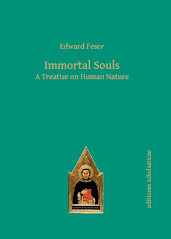 My book Immortal Souls: A Treatise on Human Naturewill be published this summer by Editiones Scholasticae. At well over 500 pages, it's my longest book yet. Here are the back cover copy, endorsements,and table of contents:
My book Immortal Souls: A Treatise on Human Naturewill be published this summer by Editiones Scholasticae. At well over 500 pages, it's my longest book yet. Here are the back cover copy, endorsements,and table of contents:ImmortalSouls provides as ambitious and complete a defense of Aristotelian-Thomisticphilosophical anthropology as is currently in print. Among the many topics covered are the realityand unity of the self, the immateriality of the intellect, the freedom of thewill, the immortality of the soul, the critique of artificial intelligence, andthe refutation of both Cartesian and materialist conceptions of humannature. Along the way, the main rivalpositions in contemporary philosophy and science are thoroughly engaged withand rebutted.
"EdwardFeser's book is a Summa of the nature of the human person: it is, therefore,both a rather long – but brilliant – monograph, and a valuable work forconsultation. Each of the human faculties discussed is treated comprehensively,with a broad range of theories considered for and against, and, althoughFeser's conclusions are firmly Thomistic, one can derive great benefit from hisdiscussions even if one is not a convinced hylomorphist. Every philosopher ofmind would benefit from having this book within easy reach."
HowardRobinson, Professor Emeritus of Philosophy, Central European University
“Feserdefends the Aristotelian and Thomistic system, effectively bringing it intodialogue with recent debates and drawing on some of the best of both analytic(Kripke, Searle, BonJour, Fodor) and phenomenological (Heidegger,Merleau-Ponty, Dreyfus) philosophy. He deftly rebuts objections to Thomism,both ancient and modern. Anyone working today on personal identity, the unity ofthe self, the semantics of cognition, free will, or qualia will need to engagewith the analysis and arguments presented here.”
Robert C.Koons, Professor of Philosophy, University of Texas at Austin
CONTENTS
Preface
Part I: Whatis Mind?
1. The Short Answer
2.The Self
3. The Intellect
4.The Will
Part II:What is Body?
5.Matter
6. Animality
Part III:What is a Human Being?
7. Against Cartesianism
8. Against Materialism
9. Neither Computers nor Brains
Part IV: Whatis the Soul?
10. Immortality
11. The Form of the Body
Index
May 10, 2024
Let’s open it up
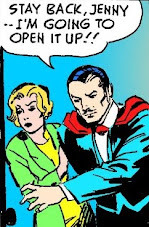 If we had anew open thread post, what would you talk about? Current events? That off-topic philosophical or theological questionyou vainly keep trying to bring up in other threads? Or perhaps one of the
Postliberal Order articles of mine
that you were unableto access before, but are now out from behind the paywall? Let’s find out. From vocalese to Daniel Keyes, from temporaryintrinsics to temporary insanity, from Eisenhower to Einstein to Eisenstein – here, everything is open for discussion. Just keep it civil and classy. Previous open threads archived here.
If we had anew open thread post, what would you talk about? Current events? That off-topic philosophical or theological questionyou vainly keep trying to bring up in other threads? Or perhaps one of the
Postliberal Order articles of mine
that you were unableto access before, but are now out from behind the paywall? Let’s find out. From vocalese to Daniel Keyes, from temporaryintrinsics to temporary insanity, from Eisenhower to Einstein to Eisenstein – here, everything is open for discussion. Just keep it civil and classy. Previous open threads archived here.
Edward Feser's Blog
- Edward Feser's profile
- 335 followers



